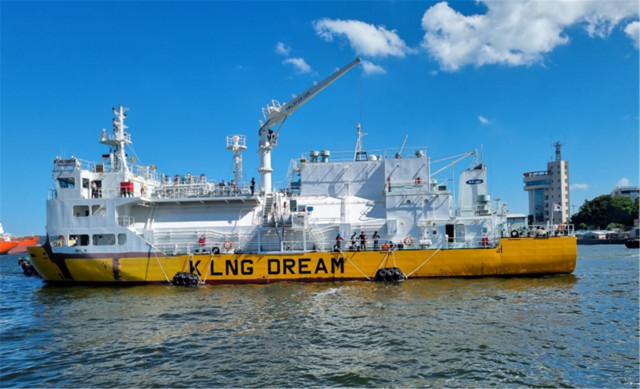South Korea’s EK Heavy Industries has held a naming ceremony for the country’s first coastal LNG bunkering ship, according to the Korea Research Institute of Ships & Ocean Engineering (KRISO).
The naming ceremony for the 500-cbm K LNG Dream took place on Tuesday and was attended by officials from the Ministry of Oceans and Fisheries, EK Heavy Industries, Korean Register, and others, KRISO said in a statement.
KRISO says this is South Korea’s first LNG bunkering vessel for coastal ships.
Capable of performing ship-to-ship LNG bunkering operations at sea, the vessel was developed purely based on domestic technology by Trans Gas Solution, POSCO, EK Heavy Industries, Mytec, Valmax Technology, and Seoul Line, according to the research institute.
To expand the LNG fuel supply infrastructure in Korea, KRISO has since 2018 participated in the LNG bunkering vessel development project under the Ministry of Oceans and Fisheries.
KRISO announced the steel-cutting ceremony for this vessel, jointly designed by the institute and Trans Gas Solution, back in May 2020.
The vessel features POSCO’s LNG storage tank with high manganese steel.
Growing number of LNG-powered vessels
KRISO expects the new bunkering ship to supply “many” LNG-powered ships that will operate along the domestic coast in the future.
According to DNV’s Alternative Fuels Insight platform, 316 LNG-powered ships are already in operation, while there are 511 LNG-fueled vessels on order.
DNV reported orders for record 83 LNG-powered vessels in the second quarter of this year.
Earlier this year, a unit of LNG importing giant Kogas signed what it says is the first ship-to-ship LNG bunkering contract in Korea.
Korea LNG Bunkering will use the 7,500-cbm SM Jeju LNG2 bunkering vessel to bunker H-Line Shipping’s iron ore carrier.
In February last year, Korea LNG Bunkering ordered its first newbuild LNG bunkering vessel at compatriot Hyundai Heavy Industries.
The 7,500-cbm vessel will join its fleet in 2023, adding to SM Jeju LNG2, Korea’s first LNG bunkering vessel which Kogas chartered from Korea Line.
Kogas previously said it aims to supply 1.36 million tons of LNG for ships by 2030 as owners increasingly opt for the fuel to meet tighter regulations and slash emissions.

